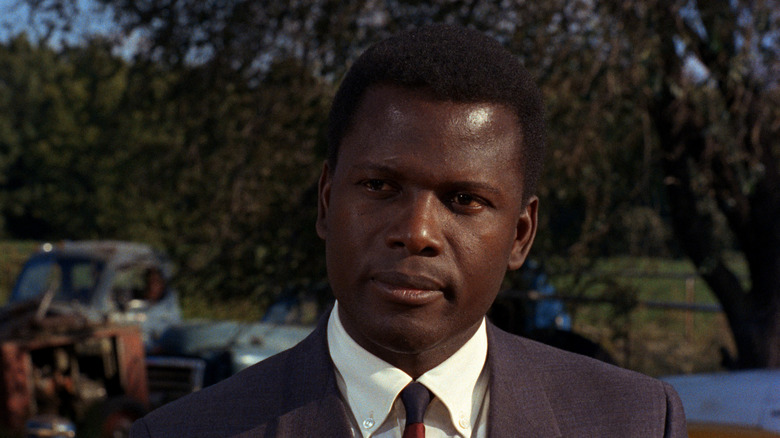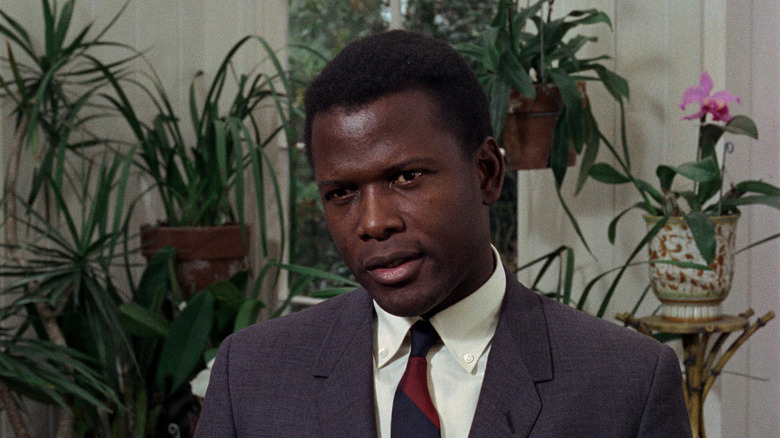In The Heat Of The Night Had To Change A Scene If They Wanted Sidney Poitier
"In the Heat of the Night" features a scene that DGA Quarterly, the official magazine of the Directors Guild of America, once called "the slap heard round the world." The phrase has taken on a different cultural connotation in the wake of the Will Smith–Chris Rock slapping incident at the 94th Academy Awards, but it was once applied to a movie that won five Oscars, including Best Picture.
"In the Heat of the Night" stars the late Sidney Poitier and Rod Steiger, though perhaps unsurprisingly — given what we know of #OscarsSoWhite history — only Steiger was nominated for his performance, despite Poitier delivering up some of the film's most memorable moments, such as the aforementioned slap and the immortal line, "They call me Mister Tibbs!" Poitier had already won Best Actor for "Lilies of the Field," and he would receive another honorary award in 2001, the same night Denzel Washington picked up his Best Actor trophy for "Training Day" and acknowledged in his acceptance speech that he'd been "chasing Sidney" for 40 years.
Directed by Norman Jewison, "In the Heat of the Night" sees Black Philadelphia detective Virgil Tibbs getting sucked into a murder investigation in Sparta, Mississippi. When he and Steiger's racist local cop go to question the town's leading citizen, Mr. Endicott (Larry Gates), in his greenhouse, the ungentlemanly Southerner — who has a Black butler — takes it upon himself to backhand Tibbs for having the temerity to interrogate him.
Rather than turn the other cheek, Tibbs hauls off and smacks Endicott right back. It turns out the slapping-him-back part was not in the script. Poitier had its inclusion written into his contract before he would agree to star in the film.
'I would have been insulting every Black person'
In a 2013 interview with "CBS Sunday Morning," Sidney Poiter explained the genesis of the Tibbs-slaps-back moment, how he was conscious of what we might now call representation in "In the Heat of the Night." He recalled telling the people who cast him, "If [Endicott] slaps me, I'm going to slap him back. You will put on paper that the studio agrees that the film will be shown nowhere in the world with me standing there taking the slap."
While answering violence with violence can sometimes make a situation worse, it's important to remember the context of Tibbs' return slap and Poitier's insistence upon including it. Stirling Silliphant, the screenwriter who penned "In the Heat of the Night," was writing from a white perspective, and he may not have appreciated the full symbolic weight of the moment in question. Coming as it did in 1967 in the midst of the civil rights movement, Poitier knew that having his character take the slap from Endicott and not stand up for himself would send the wrong message. "I knew that I would have been insulting every Black person in the world," he continued.
Endicott is stunned when Tibbs slaps him back; he only gapes at him and says, "There was a time when I could have had you shot." Yet the fact that he had no compunctions about slapping a police detective simply because of his skin color just goes to show the double standard Tibbs and the actor who played him were subverting. Imagine if this were a Black man slapping a white cop. Tibbs is an aspirational hero, and his reaction was both true to the dignity of his character and an unforgettable movie model for standing up against oppression.

